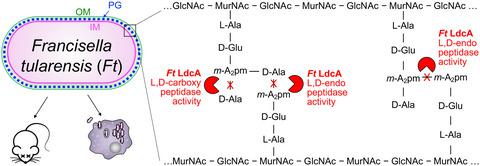当前位置:
X-MOL 学术
›
Mol. Microbiol.
›
论文详情
Our official English website, www.x-mol.net, welcomes your
feedback! (Note: you will need to create a separate account there.)
A Francisella tularensis L,D-carboxypeptidase plays important roles in cell morphology, envelope integrity, and virulence
Molecular Microbiology ( IF 2.6 ) Pub Date : 2021-01-20 , DOI: 10.1111/mmi.14685 Briana Zellner 1 , Dominique Mengin-Lecreulx 2 , Brenden Tully 1 , William T Gunning 3 , Robert Booth 3 , Jason F Huntley 1
Molecular Microbiology ( IF 2.6 ) Pub Date : 2021-01-20 , DOI: 10.1111/mmi.14685 Briana Zellner 1 , Dominique Mengin-Lecreulx 2 , Brenden Tully 1 , William T Gunning 3 , Robert Booth 3 , Jason F Huntley 1
Affiliation

|
Francisella tularensis is a Gram-negative, intracellular bacterium that causes the zoonotic disease tularemia. Intracellular pathogens, including F. tularensis, have evolved mechanisms to survive in the harsh environment of macrophages and neutrophils, where they are exposed to cell envelope-damaging molecules. The bacterial cell wall, primarily composed of peptidoglycan (PG), maintains cell morphology, structure, and membrane integrity. Intracellular Gram-negative bacteria protect themselves from macrophage and neutrophil killing by recycling and repairing damaged PG––a process that involves over 50 different PG synthesis and recycling enzymes. Here, we identified a PG recycling enzyme, L,D-carboxypeptidase A (LdcA), of F. tularensis that is responsible for converting PG tetrapeptide stems to tripeptide stems. Unlike E. coli LdcA and most other orthologs, F. tularensis LdcA does not localize to the cytoplasm and also exhibits L,D-endopeptidase activity, converting PG pentapeptide stems to tripeptide stems. Loss of F. tularensis LdcA led to altered cell morphology and membrane integrity, as well as attenuation in a mouse pulmonary infection model and in primary and immortalized macrophages. Finally, an F. tularensis ldcA mutant protected mice against virulent Type A F. tularensis SchuS4 pulmonary challenge.
中文翻译:

土拉弗朗西斯菌 L,D-羧肽酶在细胞形态、包膜完整性和毒力中起重要作用
Francisella tularensis是一种革兰氏阴性细胞内细菌,可引起人畜共患病土拉菌病。细胞内病原体,包括土拉杆菌,已经进化出在巨噬细胞和中性粒细胞的恶劣环境中生存的机制,在那里它们暴露于细胞膜破坏分子。细菌细胞壁主要由肽聚糖 (PG) 组成,维持细胞形态、结构和膜完整性。细胞内革兰氏阴性菌通过回收和修复受损的 PG 来保护自己免受巨噬细胞和中性粒细胞的杀伤——这一过程涉及 50 多种不同的 PG 合成和回收酶。在这里,我们鉴定了F. tularensis的 PG 再循环酶 L,D-羧肽酶 A (LdcA)负责将 PG 四肽茎转化为三肽茎。与E.coli LdcA 和大多数其他直向同源物不同,F. tularensis LdcA 不定位于细胞质,还表现出 L,D-内肽酶活性,将 PG 五肽茎转化为三肽茎。的损失土拉弗朗西斯菌LdcA导致在小鼠肺部感染模型改变的细胞形态和膜完整性,以及衰减和在初级和永生化的巨噬细胞。最后,F. tularensis ldcA突变体保护小鼠免受毒力 A 型F. tularensis SchuS4 肺部攻击。
更新日期:2021-01-20
中文翻译:

土拉弗朗西斯菌 L,D-羧肽酶在细胞形态、包膜完整性和毒力中起重要作用
Francisella tularensis是一种革兰氏阴性细胞内细菌,可引起人畜共患病土拉菌病。细胞内病原体,包括土拉杆菌,已经进化出在巨噬细胞和中性粒细胞的恶劣环境中生存的机制,在那里它们暴露于细胞膜破坏分子。细菌细胞壁主要由肽聚糖 (PG) 组成,维持细胞形态、结构和膜完整性。细胞内革兰氏阴性菌通过回收和修复受损的 PG 来保护自己免受巨噬细胞和中性粒细胞的杀伤——这一过程涉及 50 多种不同的 PG 合成和回收酶。在这里,我们鉴定了F. tularensis的 PG 再循环酶 L,D-羧肽酶 A (LdcA)负责将 PG 四肽茎转化为三肽茎。与E.coli LdcA 和大多数其他直向同源物不同,F. tularensis LdcA 不定位于细胞质,还表现出 L,D-内肽酶活性,将 PG 五肽茎转化为三肽茎。的损失土拉弗朗西斯菌LdcA导致在小鼠肺部感染模型改变的细胞形态和膜完整性,以及衰减和在初级和永生化的巨噬细胞。最后,F. tularensis ldcA突变体保护小鼠免受毒力 A 型F. tularensis SchuS4 肺部攻击。











































 京公网安备 11010802027423号
京公网安备 11010802027423号